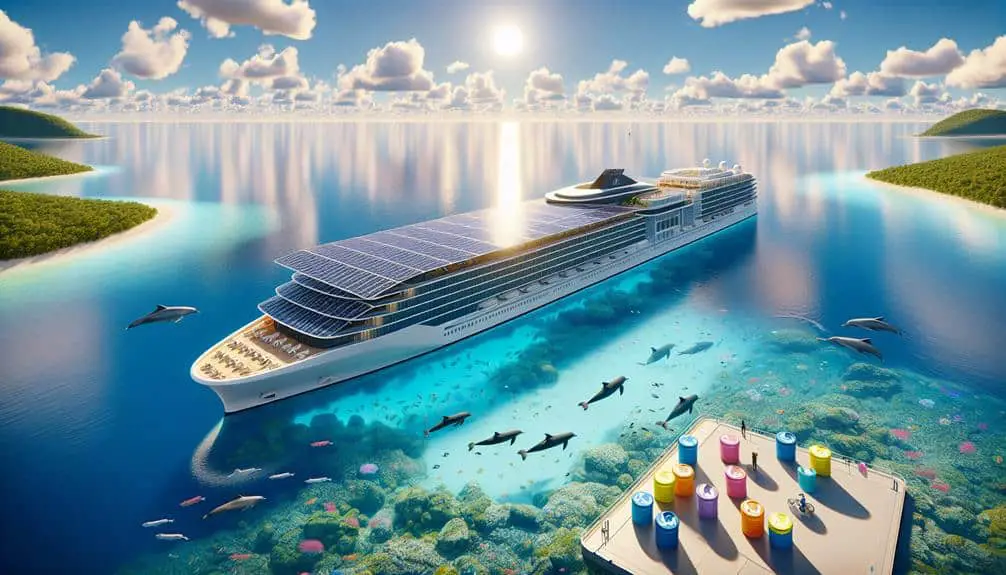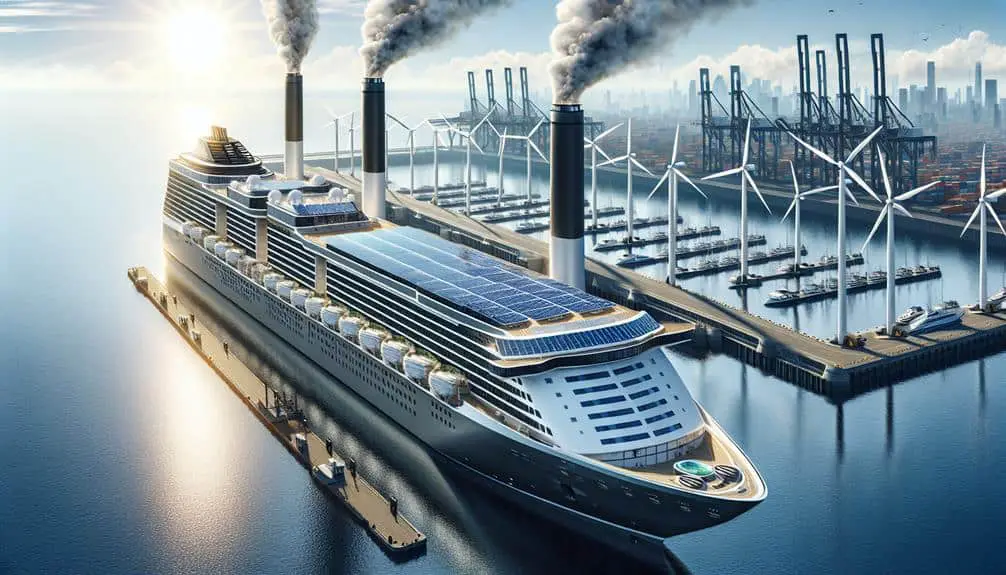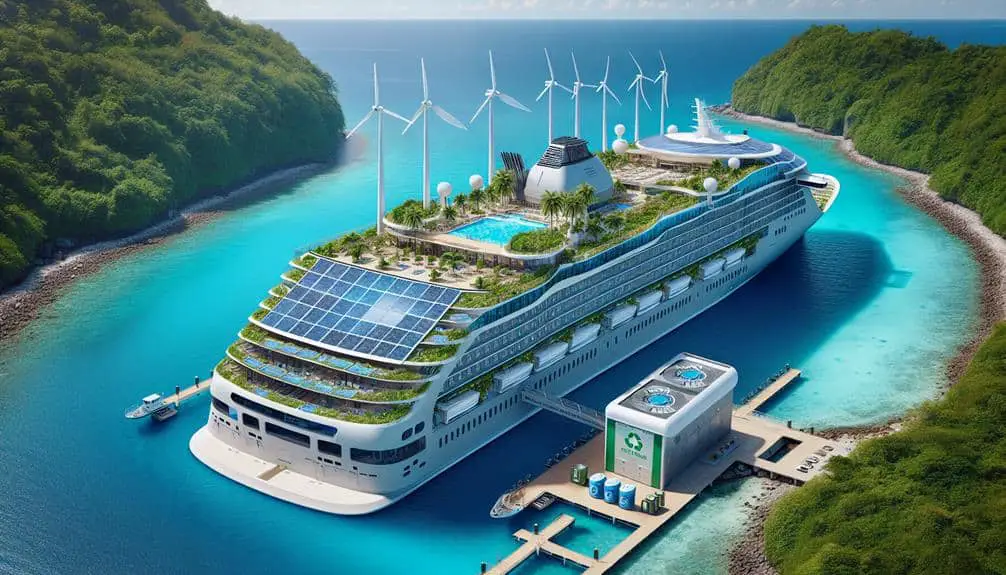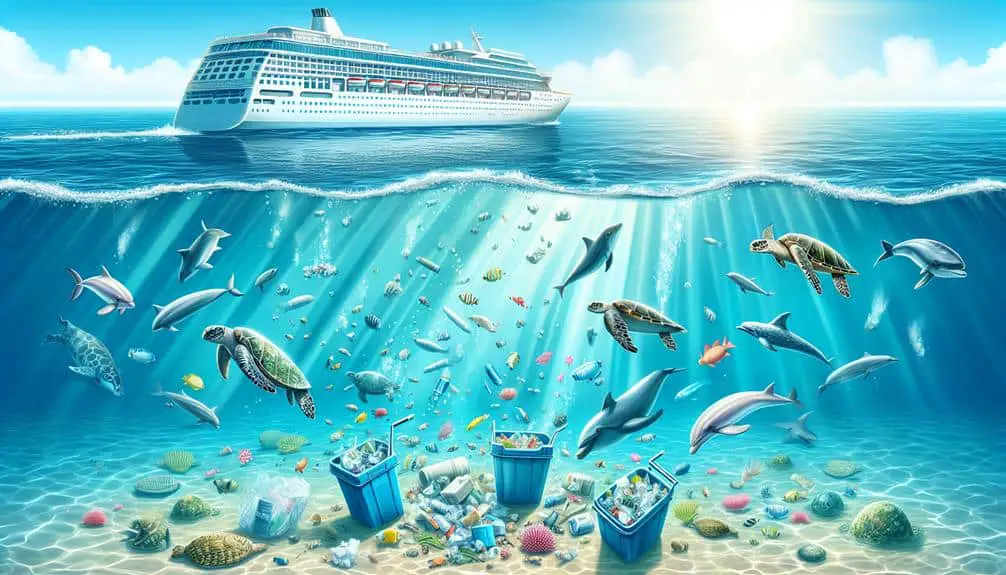Cruise lines excel in environmental responsibility through sustainable fuel practices like using LNG and biofuels to reduce emissions. They minimize single-use plastics by opting for reusable alternatives. Protecting marine life involves conservation efforts and eco-friendly excursions. Passengers are educated on environmental awareness through programs and green initiatives onboard. Adherence to international regulations guarantees minimal ecological impact. Embrace these practices for a greener cruise experience.
Key Points
- Adoption of sustainable fuel practices like LNG and biofuels
- Reduction of single-use plastics through reusable alternatives
- Commitment to protecting marine life and habitats
- Implementation of environmental awareness programs for passengers
- Compliance with international environmental regulations for sustainability
Implementing Sustainable Fuel Practices
To enhance environmental sustainability, cruise lines are increasingly adopting sustainable fuel practices to reduce carbon emissions. One key strategy being implemented is the utilization of alternative energy sources such as liquefied natural gas (LNG) and biofuels. LNG, for instance, has shown promising results in reducing sulfur oxide and nitrogen oxide emissions compared to traditional marine fuels. Additionally, biofuels derived from organic materials offer a renewable energy option that can meaningfully decrease greenhouse gas emissions.
Moreover, cruise lines are actively engaging in carbon offsetting programs to further mitigate their environmental impact. By investing in projects that reduce carbon dioxide in the atmosphere, such as reforestation initiatives or renewable energy projects, cruise lines can balance out their carbon footprint. This approach allows them to compensate for the emissions produced during voyages, contributing to the overall goal of achieving carbon neutrality within the industry. Embracing these sustainable fuel practices and participating in carbon offsetting programs are critical steps towards a more environmentally responsible cruise industry.
Minimizing Single-Use Plastics
With the increasing focus on environmental sustainability in the cruise industry, a substantial initiative being pursued is the reduction of single-use plastics onboard ships. Cruise lines are increasingly turning to reusable alternatives to minimize the environmental impact of single-use plastics. By implementing these changes, cruise companies can significantly contribute to waste reduction efforts.
Research data indicates that a large portion of marine debris comes from single-use plastics, posing a substantial threat to marine life and ecosystems. Switching to reusable alternatives such as stainless steel straws, refillable water bottles, and biodegradable food containers can greatly reduce plastic waste generated on cruise ships.
Incorporating these changes not only aligns with the growing consumer demand for eco-friendly practices but also showcases the industry's commitment to environmental responsibility. By actively pursuing the minimization of single-use plastics, cruise lines can set a positive example for sustainable practices within the broader tourism sector.
Protecting Marine Life Through Conservation Efforts
Marine life conservation efforts in the cruise industry demonstrate a pivotal commitment to preserving biodiversity and ecosystems. Cruise lines are increasingly engaging in the protection of marine sanctuaries, recognizing them as essential areas for marine species conservation. Research indicates that cruise activities can impact marine ecosystems, making initiatives such as supporting marine sanctuaries crucial for the sustainability of these environments. By collaborating with local authorities and environmental organizations, cruise lines can contribute to the preservation of marine habitats within these sanctuaries.
Moreover, offering eco-friendly excursions allows cruise passengers to experience marine life in a sustainable manner. These excursions not only educate passengers on the importance of marine conservation but also provide financial support for ongoing conservation efforts. Research shows that eco-friendly excursions can help reduce negative impacts on marine ecosystems while promoting responsible tourism practices. Through these initiatives, cruise lines are actively participating in safeguarding marine life and promoting environmental awareness among passengers.
Educating Passengers on Environmental Awareness
Passengers onboard cruise ships benefit from engaging environmental awareness programs that emphasize responsible tourism practices and foster a deeper understanding of marine conservation. These programs often include educational sessions on eco-friendly excursions, highlighting the importance of supporting sustainable tourism activities that minimize negative impacts on the environment.
Additionally, cruise lines have been implementing various green onboard initiatives to further educate passengers on environmental awareness. These initiatives range from waste management programs that promote recycling and proper disposal practices to energy-efficient technologies that reduce the overall carbon footprint of the ship.
Complying With International Environmental Regulations
Adhering to international environmental regulations is essential for cruise lines to minimize their ecological impact and guarantee sustainability in the maritime industry. Compliance with these regulations not only guarantees the protection of marine ecosystems but also enhances the industry's reputation and long-term viability.
Incorporating eco-friendly technology is a vital aspect of complying with international environmental regulations. Cruise lines are increasingly investing in innovative solutions such as advanced wastewater treatment systems, exhaust gas cleaning systems, and energy-efficient propulsion technologies to reduce their carbon footprint and limit harmful emissions.
Furthermore, waste management strategies play a significant role in regulatory compliance. Implementing practices like recycling, waste-to-energy programs, and onboard waste segregation systems enables cruise lines to meet strict international standards regarding waste disposal and pollution prevention.
Frequently Asked Questions
How Do Cruise Lines Ensure the Sustainability of Their Waste Management Practices?
To guarantee the sustainability of waste management practices, cruise lines implement robust recycling programs and waste reduction strategies. They invest in green technology, adhere to stringent environmental regulations, and continually seek innovative solutions to minimize their ecological footprint.
What Measures Do Cruise Lines Take to Reduce Their Carbon Footprint Beyond Implementing Sustainable Fuel Practices?
As you explore the domain of cruise line environmental efforts, envision energy efficiency initiatives as beacons of progress. Environmental education programs enlighten minds, while green technology advancements and carbon offset programs propel sustainability to new heights.
How Do Cruise Lines Support Local Communities and Ecosystems in the Destinations They Visit?
To support local communities, cruise lines engage in community projects, economic partnerships, and cultural exchanges. Ecosystem conservation efforts include waste management, marine life protection, and promoting sustainable tourism practices to preserve the natural environment for future generations.
What Initiatives Do Cruise Lines Have in Place to Address the Impact of Noise Pollution on Marine Life?
To address marine life impact from noise pollution, cruise lines implement advanced technology solutions. These initiatives support marine conservation efforts by reducing noise emissions. Such actions align with ecotourism principles, emphasizing marine wildlife protection and fostering sustainable practices within the cruise industry.
How Do Cruise Lines Promote Sustainable Seafood Sourcing and Responsible Dining Options for Passengers?
Do you know how cruise lines guarantee eco-friendly menus and sustainable sourcing practices for your dining pleasure? They carefully choose seafood from responsible sources, prioritizing environmental impact reduction and passenger satisfaction.




